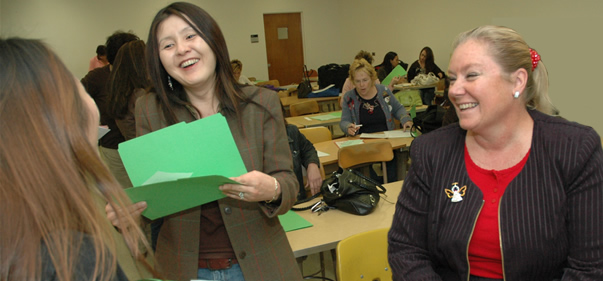Education Professors Offer Guidance and Support to New K-12 Teachers Working With Special Education Students
December 19, 2006
By Laurie McLaughlin
Part of California’s teacher credentialing program requires new K-12th grade general education teachers to meet certain requirements during their first two years on the job. This “induction” period is intended to provide these new educators with additional skills to manage their classrooms.
“The idea is that they spend the first two years enrolled in an induction program that will provide them with support,” says Belinda Karge, professor of special education. Passed into law five years ago and officially titled the California Beginning Teacher Support and Assessment (BTSA) Induction, the programs are routinely offered by school districts in collaboration with universities. The Cal State Fullerton program, administered by Karge, trains K-12 teachers working with students with special needs in their classrooms.
“Imagine you have a brand new fourth-grade teacher, and she is assigned a classroom of 25 children, and two of them have attention deficit hyperactivity disorder. We provide the training for what to do with the children, how to support the child or coach them about the medication they may be taking, all of which helps the teacher manage the classroom in a way that benefits all of her students,” says Karge. “We teach something called ‘positive behavior support,’ modeling how to be proactive in supporting children with special needs in the classroom so that they don’t get themselves into trouble.”
Karge and colleague Barbara Glaeser, chair and professor of special education, work with a consortium of school districts in Walnut and the Inland Empire, as well as the Norwalk-La Mirada Unified School District. The school districts contract CSUF using funds they receive from the California Commission on Teacher Credentialing. Recently, a $13,959 renewal of the program for a third year from Norwalk-La Mirada USD brought the current contract total with CSUF to $100,000 for the various districts.
Each of the programs for the various districts is different, says Karge. “In Walnut and the Inland Empire, we partner with veteran teachers to lead monthly workshops. Recently, we did one on special education law, which was very successful.” With the Norwalk-La Mirada school district, Karge and Glaeser use the trainer-and-trainer model. “We teach teacher leaders from the district how to administer the special ed standards, and they take it back and teach a group of teachers in their school district,” she says.
The CSUF program services 800 new teachers annually, many of who received either their degree and/or credential from the university. Jamie Highstreet earned a bachelor’s degree in liberal studies in 2003, an elementary teaching credential a year later and participated in the CSUF induction program.
“I not only learned to help English language learners in my classroom but the other students as well with a multitude of strategies,” says Highstreet, who has been teaching first grade with the Walnut Valley Unified School district for three years. “The fact that teachers are presented with information from many different areas and from a variety of experts makes the experience not only valuable but interesting.”
“I travel up and down the state, and many universities with similar contracts have professors who give a bit of advice to teachers and show up once a month at a meeting,” said Karge. “We’ve established a reputation for having excellent partnerships with our local school districts. With our program, we have a true collaboration, and we really get to have fun and take part in the training of local educators.”


 Produced by the Office of Public Affairs at California State University, Fullerton.
Produced by the Office of Public Affairs at California State University, Fullerton.